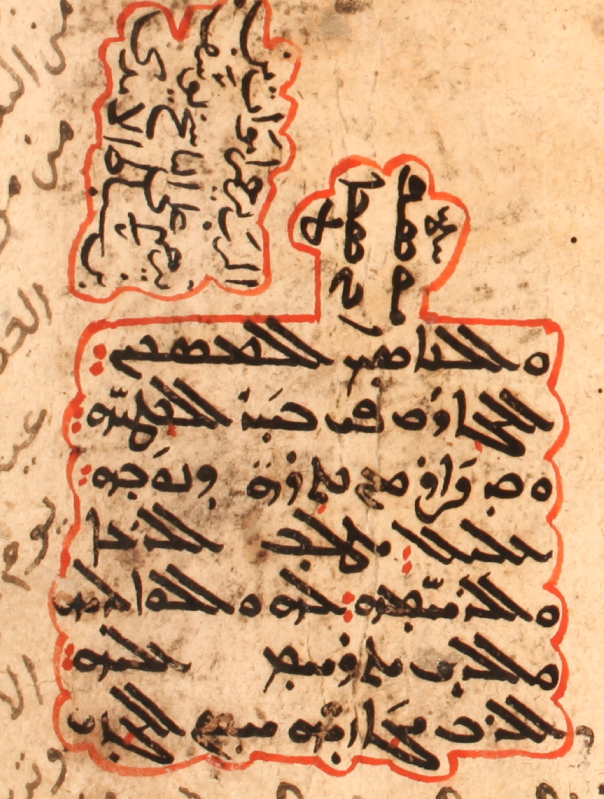Some time ago I pointed out an Arabic/Garšūnī colophon with the phrase, “sinking in the sea of sin,” and I have since found another example from the fourteenth century (SMMJ 250, dated 1352, f. 246r, image below; sim. on f. 75r of the same manuscript).

Ephrem the Syrian, Mosaic in Nea Moni, 11th cent. Source. The lines at the bottom are from Lk 6:21: “Blessed are those who weep now, because you will laugh.”
From the pen of my colleague, Edward G. Mathews, Jr., has recently appeared a little book of the collection of Armenian prayers attributed to Ephrem (vol. 4 of the Mekhitarist ed., [Venice, 1836], pp. 227-276; the prayers are also in an edition from Jerusalem [1933], and others), with Armenian text and facing English translation: The Armenian Prayers (Աղօթք) attributed to Ephrem the Syrian, TeCLA 36 (Gorgias Press, 2014). A concise and helpful introduction opens the book, and it concludes with indices for scripture and subject.
There is a lot of sin in the Armenian prayers attributed to Ephrem the Syrian. And there are a lot metaphors for sin in them, too, which may be wholesome fodder for certain classes of philologist. As I was going through this new book, it seemed like a fine idea to highlight some of the places in these ps.-Ephremian prayers that are similar to the Arabic phrase mentioned above. Some of the lines below have vocabulary similar to the “peaceful harbor” imagery that is used in colophons, on which see my paper, “The Rejoicing Sailor and the Rotting Hand: Two Formulas in Syriac and Arabic Colophons, with Related Phenomena in some Other Languages,” Hugoye 18 (2015): 67-93 (available here). This kind of language also reaches beyond biblical, patristic, and scribal texts. We hear Jean Valjean uttering “whirlpool of my sin” in “What Have I Done?” from Les Misérables.
Now for our examples from these Armenian prayers attributed to Ephrem. For these few lines I’m giving the Armenian text, Mathews’ English translation, and for fellow students of Armenian, a list of vocabulary.
I.1
…եւ ի յորձանս անօրէնութեան տարաբերեալ ծփին,
եւ առ քեզ ապաւինիմ,
որպէս Պետրոսին՝ ձեռնարկեա ինձ։
- յորձան, -աց torrent, current, whirlpool
- անօրէնութիւն iniquity, impiety
- տարաբերեմ, -եցի to shake, agitate, move, stir
- ծփեմ, -եցի to agitate, trouble
- ապաւինիմ, -եցայ to trust, rely, take refuge, take shelter
- ձեռնարկեմ, -եցի to put one’s hand to
…I am floundering and tossed about in torrents of iniquity.
But I take refuge in You,
Reach out Your hand to me as You did to Peter.
I.2
Ո՛վ խորք մեծութեան եւ իմաստութեան,
փրկեա՛ զըմբռնեալս՝
որ ի խորս մեղաց ծովուն անկեալ եմ.
- խորք, խրոց pit, depth, bottom, abyss
- փրկեմ, -եցի to save, deliver
- ըմբռնեմ, -եցի to seize, trap, catch
- մեղ, -աց sin
- ծով, -ուց sea
O depths of majesty and of wisdom,
Deliver me for I am trapped,
and I have fallen into the depths of the sea of sin.
I.7
նաւապետ բարի Յիսուս՝ փրկեա՛ զիս
ի բազմութենէ ալեաց մեղաց իմոց,
եւ տո՛ւր ինձ նաւահանգիստ խաղաղութեան։
- նաւապետ captain
- ալիք, ալեաց wave, surge, swell
- տո՛ւր impv 2sg տամ, ետու to give, provide, make
- նաւահանգիստ port, haven, harbor
- խաղաղութիւն peace, tranquility, rest, quiet
O Good Jesus, my Captain, save me
from the abundant waves of my sins,
and settle me in a peaceful harbor.
I.20
Ձգեա՛ Տէր՝զձեռս քո ի նաւաբեկեալս՝
որ ընկղմեալս եմ ի խորս չարեաց,
եւ փրկեա՛ զիս ի սաստիկ ծովածուփ բռնութենէ ալեաց մեղաց իմոց։
- ձգեմ, -եցի to stretch, extend, draw
- նաւաբեկիմ to run aground, founder, be shipwrecked
- ընկղմեմ, -եցի to sink, submerge, drown, bury
- շարիք, -րեաց, -րեօք evil deeds, iniquity; disaster
- սաստիկ, սաստկաց extreme, intense, violent, strong
- ծովածուփ tempestuous, stormy
- բռնութիւն violence, fury (< բուռն, բռանց fist, with many other derivatives)
Stretch forth, O Lord, Your hand to me for I am shipwrecked
and I am drowning in the abyss of my evil deeds.
Deliver [me] from the stormy and violent force of the waves of my sins.
I.64
Խաղաղացո՛ զիս Տէր՝ ի ծփանաց ալեաց խռովութեանց խորհրդոց,
եւ զբազմւոթեան յորձանս մեղաց իմոց ցածո՛,
եւ կառավարեա՛ զմիտս իմ ժամանել
յանքոյթ եւ ի խաղաղ նաւահանգիստն Հոգւոյդ սրբոյ։
- Խաղաղացո՛ impv 2sg խաղաղացուցանեմ, խաղաղացուցի to calm
- ծփանք wave, billow
- ձորձան, -աց current, torrent, whirlpool
- ցածո՛ impv 2sg ցածուցանեմ, ցածուցի to reduce, diminish, soften, calm, humiliate
- կառավերեմ, -եցի to guide, direct, govern
- միտ, մտի, զմտաւ, միտք, մտաց, մտօք mind, understanding
- ժամանեմ, -եցի to arrive, be able, happen
- անքոյթ safe, secure
Grant me peace, O Lord, from the billowy waves of my turbulent thoughts,
Abate the many whirlpools of my sins.
Steer my mind that it may come
To the safe and peaceful harbor of Your Holy Spirit.
In I.81, we have, not the sea, but, it seems, a river (something fordable):
Անցո՛ զիս Տէր՝ ընդ հուն անցից մեղաց…
- Անցո՛ impv 2sg անցուցանեմ, անցուցի to cause to pass, carry back, transmit
- հուն, հնի ford, shallow passage
- անցք, անցից passage, street, channel, opening
Bring me, O Lord, through the ford of the river of sins…
The sea and drowning are by no means the only metaphors for sin in these prayers. Others from pt. I include ice (15), dryness (21), thorn (23; also p. 120, line 8), sleep (25), darkness (39, 102), nakedness (44-45), bondage and prison (54, 93), a quagmire (62), an abyss (71), “dung and slime” (72), and a weight and burden (123, 125, 129). From pt. III, p. 106, ll. 29-30:
հա՜ն զիս ի տղմոյ անօրէնութեան իմոյ,
զի մի՛ ընկլայց յաւիտեան։
- հա՜ն impv 2sg հանեմ, հանի to remove, dislodge, lift up
- տիղմ, տղմոյ mire, mud, filth
- ընկլայց aor subj m/p 1sg ընկլնում, -կլայ (also ընկղմիմ, -եցայ!) to founder, sink, be plunged
- յաւիտեան, -ենից eternity
Remove me from the mire of my iniquity
lest I sink in forever.
Metaphors from nature for things other than sin are “the ice of disobedience,” “the fog of mistrust,” “the raging torrents of desires for pleasures,” and ” the spring of falsehood” in pt. VI, p. 136, ll. 23-26.
Whether these places are of interest to you spiritually, conceptually, philologically, or some combination of those possibilities, I leave you to ponder them.

Leave a comment